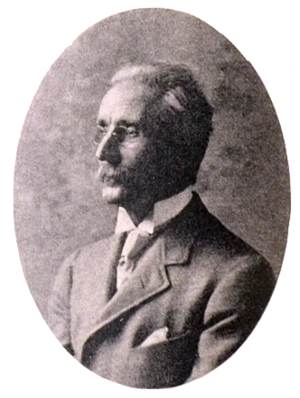Théodore Gribi: Difference between revisions
No edit summary |
|||
| Line 22: | Line 22: | ||
==Legacy and Recognition== | ==Legacy and Recognition== | ||
Gribi died | Gribi died on February 17 [[1922]], hit by a car in Los Angeles. Aged 82, Gribi left behind a legacy that resonates in the annals of horology and industry advancement. Despite his unfulfilled desire to revisit Switzerland, his compatriots remembered him with gratitude for the significant contributions made to the Swiss watchmaking industry abroad. | ||
[[Category:Biography G|Gribi, Théodore]] | [[Category:Biography G|Gribi, Théodore]] | ||
Revision as of 02:45, 6 December 2024

Théohilus "Théo" Gribi (1840–1922) was a Swiss watchmaker who spent most of his career in America. He famously warned the Swiss watchmaking industry about the manufacturing capabilities of American factories along with Jacques David.
Early Life and Education
Born in 1840 in Lengnau, Switzerland, Théodore Gribi established himself in watchmaking as a young man. He worked for the Neuchâtel firm of Borel et Courvoisier in the 1870s and contributed to their excellent reputation for quality and chronometry.
Gribi was known as "Theo" throughout his career, especially in America.
Philadelphia Universal Exhibition
Gribi was appointed by the Commission Internationale de la Suisse Romande to be a special delegate for Swiss watchmaking at the Universal Exposition in Philadelphia in 1876. With an allowance of 4000 francs to cover his expenses, subsidized by the French-speaking cantons, Gribi was to attend the exhibition and return a report of the state of watchmaking in the United States. Gribi was tasked to be "a man who can take care of the Swiss section of the watchmaking industry on a permanent basis, who can wind and clean watches, that he knows the products and English." But Gribi was primarily sent to investigate the American watchmaking technology on behalf of the Swiss Jura industry.
What Gribi saw in Philadelphia alarmed him. The United States was far ahead of Switzerland in terms of mechanization and standardization and its products were superior in quality. Gribi's report was withdrawn by the Commission, but they privately encouraged others to attend the Exposition. One of these, Jacques David of Longines, traveled with Gribi and others to visit factories in Massachusetts and Illinois. On returning to Switzerland, David pushed Longines and others to adopt American-style production.
Gribi in America
Gribi chose to remain in the United States permanently. He established himself in Chicago for many years, though he also traveled to New York and Massachusetts and worked with watch manufacturers there. In 1915 Gribi moved to Los Angeles, where he spent the rest of his life.
Gribi's contributions extended beyond his primary work responsibilities. From 1899 to 1901, he published the "Practical Setting Course" in the Jewelers' Circular, a New York paper dedicated to watchmaking. This treatise, later revised and supplemented as a book, became an essential resource for watch adjusters, complementing theoretical publications on watch regulation. It was eventually published in Switzerland as well.
Legacy and Recognition
Gribi died on February 17 1922, hit by a car in Los Angeles. Aged 82, Gribi left behind a legacy that resonates in the annals of horology and industry advancement. Despite his unfulfilled desire to revisit Switzerland, his compatriots remembered him with gratitude for the significant contributions made to the Swiss watchmaking industry abroad.